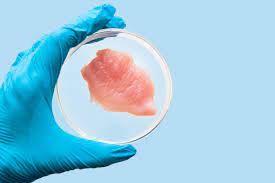BestGrowthStocks.com: Unveiling the Future of Food
June 21, 2023
In a groundbreaking move, U.S. regulators have granted approval for the sale of chicken made from animal cells. This decision paves the way for California-based companies Upside Foods and Good Meat to bring “lab-grown” meat to the tables of American restaurants and, eventually, supermarket shelves.
The U.S. Department of Agriculture has given the green light to these innovative firms, marking the advent of a new era in meat production. With a focus on eliminating harm to animals and significantly reducing the environmental impact of traditional farming practices, “cell-cultivated” or “cultured” meat is set to revolutionize the industry.
Josh Tetrick, co-founder and CEO of Eat Just, the parent company of Good Meat, explains the significance of this breakthrough: “Instead of using vast amounts of land and water to feed animals that are ultimately slaughtered, we can do it differently.”
These visionary companies have obtained the necessary federal approvals for inspections, clearing the way for the sale of their meat and poultry products in the U.S. The U.S. Food and Drug Administration had previously deemed the products from both companies safe for consumption. Joinn Biologics, a manufacturing company working alongside Good Meat, has also received clearance to produce these innovative food items.
Cultivated meat is grown in controlled environments such as steel tanks, using cells obtained from living animals, fertilized eggs, or specialized cell banks. Upside Foods produces large sheets of cultured chicken that are then shaped into cutlets and sausages. Good Meat, already selling cultivated meat in Singapore, transforms chicken cells into an array of products including cutlets, nuggets, shredded meat, and satays.
While we eagerly anticipate the availability of this groundbreaking meat in grocery stores across the United States, it’s important to note that cultivated chicken is currently more expensive than traditional farmed meat and cannot yet be produced on the same scale. Ricardo San Martin, director of the Alt:Meat Lab at the University of California, Berkeley, explains the current challenges: “We are still working on scaling up and lowering the cost.”
To introduce this novel culinary experience to the public, both companies plan to first serve their cultivated meat in exclusive restaurants. Upside Foods has partnered with San Francisco’s renowned Bar Crenn, while Good Meat’s tantalizing dishes will be featured at a Washington, D.C. restaurant led by the renowned chef and owner Jose Andrés.
It is worth highlighting that these products are real meat, not substitutes like the Impossible Burger or offerings from Beyond Meat, which are made from plant-based proteins. Over 150 companies globally are currently focused on cell-based meat production, exploring not only chicken but also pork, lamb, fish, and beef, recognizing the substantial environmental impact of traditional livestock farming.
Upside Foods, headquartered in Berkeley, operates a state-of-the-art 70,000-square-foot facility in Emeryville. Within their gleaming commercial kitchen, chef Jess Weaver skillfully prepares a cultivated chicken filet, sautéed in a white wine butter sauce with tomatoes, capers, and green onions. The finished product closely resembles its conventionally farmed counterpart, both in appearance and taste.
Amy Chen, Upside’s Chief Operating Officer, shares a common response they receive from those who have tried their product: “Oh, it tastes like chicken.”
Similarly, Good Meat, based in Alameda, operates a cutting-edge 100,000-square-foot plant. Chef Zach Tyndall crafts a mouthwatering smoked chicken salad, followed by a succulent chicken “thigh” served on a bed of creamy potato puree with a rich mushroom-vegetable demi-glace and delicate purple cauliflower florets. Good Meat’s chicken products come pre-cooked, requiring only simple heating to be incorporated into a wide range of culinary creations.
While some consumers may initially feel skeptical or squeamish about the concept of eating meat grown from cells, this groundbreaking development in food production holds tremendous potential. The ability to produce meat in controlled environments not only reduces the environmental footprint associated with traditional farming practices but also addresses ethical concerns surrounding animal welfare.
These innovations are reshaping industries, challenging traditional norms, and opening doors to exciting new possibilities.
At BestGrowthStocks.com, we remain committed to providing you with the latest insights and analysis on the most impactful trends in the market. Stay tuned as we continue to unveil the future of investing and the food industry.
Disclaimer: The content provided in this article is for informational purposes only and should not be considered financial or dietary advice. Always conduct thorough research and consult with professionals before making investment decisions or dietary changes.







